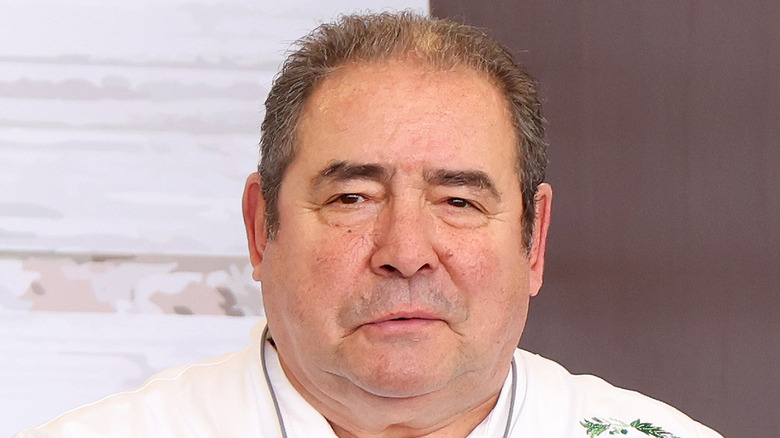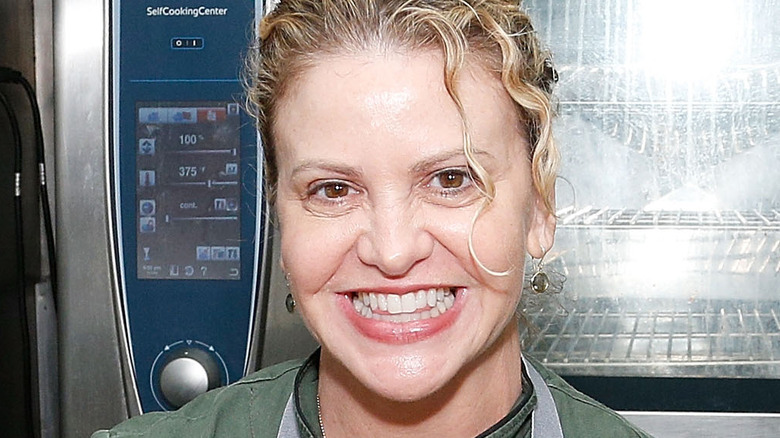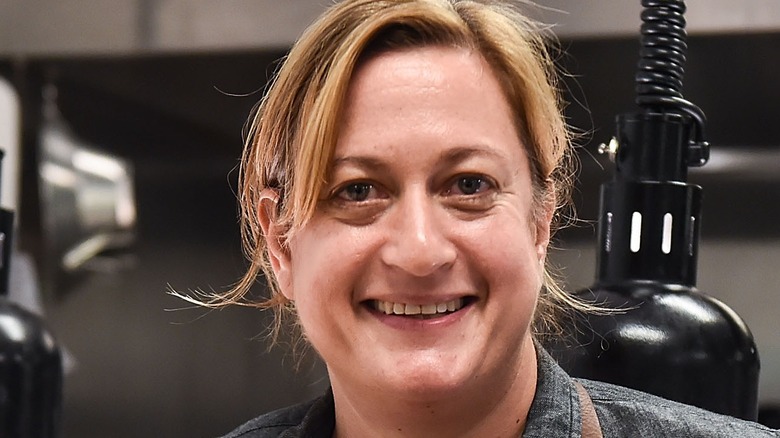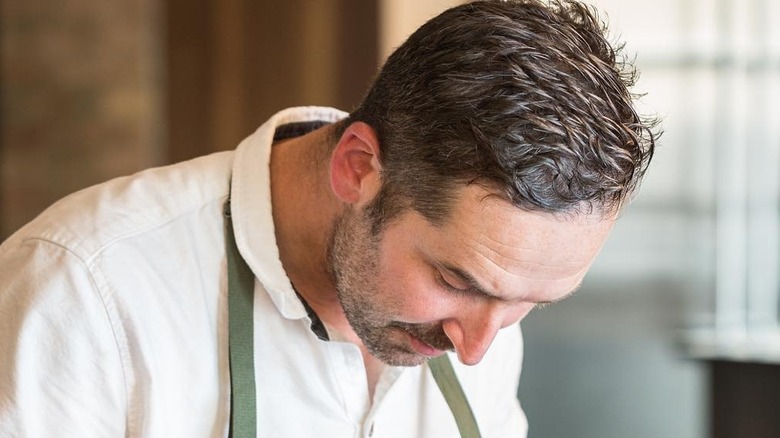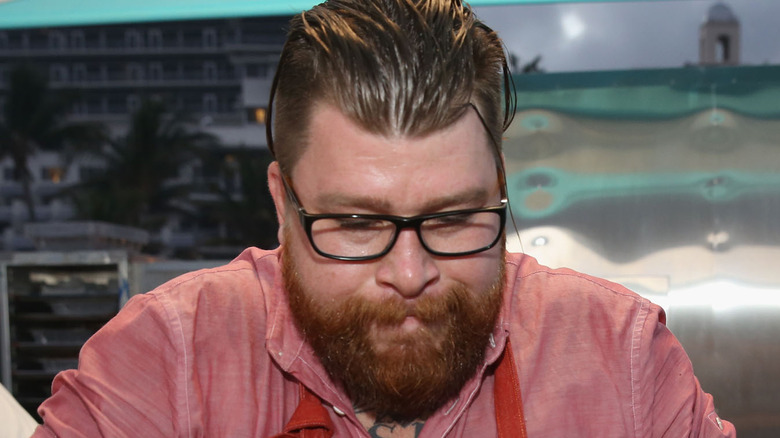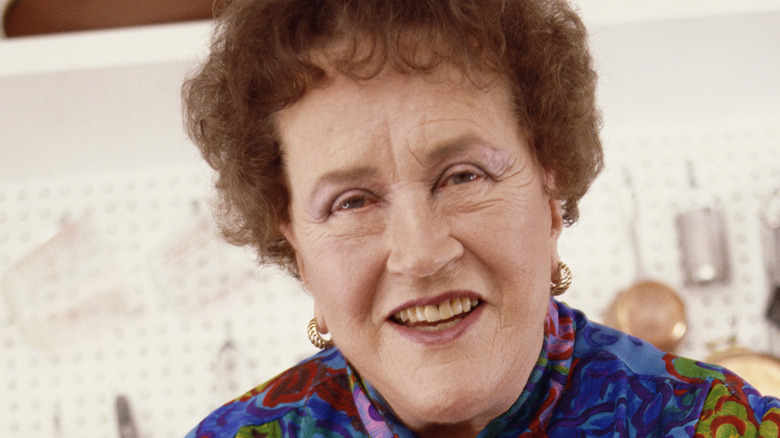15 Cooking Mistakes Celebrity Chefs Admit To Making
Julia Child was one of America's most beloved celebrity chefs — maybe even the first of the bunch. Her chipper personality and quirky voice won over audiences across the nation during her television appearances between the 1960s and 1990s. But Julia often made cooking mistakes on air, and while these could have easily been edited out, she insisted on keeping them, thereby showing home cooks that it's okay to make mistakes, and that many of them can be rectified with a bit of creativity. Julie Cohen, a co-director of the 2021 documentary "Julia," about Julia Child's life and career, explained in a 2021 interview with Mashed that this relatability is one of the aspects that made Child so popular — not only as a celebrity chef but as someone who models a different behavior for "women who are used to feeling like they need to feel really bad about what when you mess up."
Since those days, a number of other high-profile chefs have become household names through their own TV shows, famous restaurants, social media, or frequent media appearances. All of these people have made mistakes because to err is human — but not everyone has been willing to admit it. Let's meet some of the chefs who, like Julia, have become a bit (or a lot) more relatable precisely because of their mistakes.
Gordon Ramsay - Adding too many ingredients
When you embark on writing a novel, a common piece of advice is "write what you know." This may be true in the culinary world as well, at least in part. Gordon Ramsay, who is Scottish, learned this the hard way during a 2009 filming for his show "The F Word." He tried to make a pad Thai for a group of Buddhist monks in London and asked Chef Chang, the executive chef of the now-defunct Blue Elephant in London, a Thai restaurant, to give it a try first. Chef Chang was not impressed, saying it did not taste like a pad Thai. Ramsay had added some non-traditional ingredients, which may have thrown off the delicate sweet and salty flavor the dish is known for.
Ramsay may also have added too much salt, another foible he has frequently been guilty of in the past. During an episode of his series "Gordon's Great Escapes," the chef entered a competition in Thailand and another in India, both times losing out on the top spot because the judges deemed his dishes too salty.
David Chang - Not using a knife properly
David Chang accidentally cuts himself a lot in the kitchen, to the point where he's had to go to the emergency room, which is a little disconcerting for a professional chef. Yet he soldiers on and learns from his mistakes. The worst incident in his career, as he told "The Tonight Show with Jimmy Fallon," occurred when he was working at an Izayaka in Japan back in 2003.
He was not familiar with any of the knives in that kitchen except for the cleaver, and even that only marginally. Nevertheless, his colleagues urged him to use it as a sort of right of passage. Things did not go well. Chang cut off the tip of his finger pretty seriously while making himself the butt of the joke for the rest of the staff, some of whom informed him that he was not ready to work in that kitchen. But Chang persevered, using his own knives this time, and eventually his colleagues taught him how to use a cleaver without hurting himself or others. Now it's pretty safe to say that he knows his way around a kitchen knife, though accidents still do happen.
Eric Ripert - Not leaving the attitude at the door
Chef Eric Ripert of Le Bernardin, in New York City, is not the only chef guilty of having fostered a toxic kitchen environment. For decades, foul language, humiliation, and other aggressive tactics were the norm in high-end restaurants in America and elsewhere. In recent years, this has started to change, and many chefs have come out and apologized for their past behavior and attempted to make amends in their kitchens by creating safe environments.
Eric Ripert is one of these. In a 2022 essay for Fast Company, he explained that there was a time when he would scream at staff on a daily basis, break plates, and even throw food on the floor if he didn't think it was up to par. But after realizing that he couldn't be happy if he continued to harbor this level of anger, and that "you're not going to get better results if your team is scared," he revisited his kitchen policies and noticed that his staff also became happier and started to stay in their jobs for longer periods of time.
Emeril Lagasse - Forgetting to adjust cooking instructions to altitude
Once you reach higher altitudes, starting from about 2,000 feet, food starts to bake and cook differently than it would at sea level. This means that you'll have to adjust your cooking and baking times and temperatures to accommodate the change in pressure, or you may end up with a very different result from what you're used to. Sometimes you may even have to change the whole recipe, as the decreased pressure at higher altitudes will cause liquids in your foods to evaporate more quickly, while gases will tend to expand more quickly.
Emeril Lagasse experienced this first hand. He was tasked with making a pineapple upside-down cake at a home located at a very high altitude. But things didn't work out: he forgot to adjust for the altitude, and the cake "blew up inside the oven," as he told Delish in a 2014 article. Luckily, because of Emeril's skill and creativity, he was able to salvage dessert time with some bananas and good ice cream, but too bad for the pineapples!
Lee Anne Wong - Not understanding your ingredients
Sea urchin is a tricky ingredient, especially if you're not very familiar with how it behaves and pairs with other foods. It packs a powerful flavor punch with an undeniable seafood element. So maybe it's not the best choice to include in a sweet dish. This is what Lee Anne Wong discovered when she tried to create a sea urchin-based dessert to replace a foie gras ganache. She opted for a sea urchin sorbet, and it did not go over well at the taste test. In fact, she said it was downright offensive to a Japanese colleague.
When using sea urchin, called uni in Japan, it's best to stick to raw sushi or sashimi dishes or include it in a dedicated seafood sauce. You can also get creative with uni, so long as you steer clear of the dessert realm. You can use it as a topping for toasts or omelets, or pair it with other fancy, rich ingredients such as bone marrow or good butter.
Wolfgang Puck - Not paying attention to your oven settings
One thing everyone should do before they start cooking is get to know their oven and stove settings. We no longer live in an era where the only options were on or off, fire or coals. Now we have ovens that can cook pizza to crispy perfection or heat meat to the exact level of doneness you desire, and stoves that can boil water in 30 seconds flat. In this world of high-tech cooking apparatuses, it's important to know your buttons.
Wolfgang Puck may know his buttons, but on one fateful Thanksgiving, he wasn't paying much attention to them — that is, he wasn't wearing his glasses and couldn't see what he was pressing. The result was a very sad and overcooked turkey. When he put the turkey in the oven to keep it warm, he accidentally pressed "broil" instead of "bake," leading to a perfectly blackened turkey. Due to extreme skill or sheer luck, however, the turkey turned out great: Puck removed the blackened skin, sliced the meat up, and served it without a word. His guests marveled at the meat's delicious smokiness!
Michelle Bernstein - Failing to use the correct ingredients
When you work in a restaurant, things move fast. As customers pour in and orders start to arrive, the kitchen turns into a bundle of stress and chaos as everyone scrambles to prepare the food on time, just the way it's meant to be.
While working for Chef Jean-Louis Palladin of Washington D.C. fame, Michelle Bernstein did not prepare a certain meal the way it was meant to be. She used a high-quality fish that had been intended for a delicate poaching operation to make a fried dish, which doesn't require anything fancy to be delicious. This left the chef with oily fish for his poached recipe — great for frying, but not ideal for poaching. Bernstein was kicked off the team but not fired, which is lucky for us, because her career continued and her current venture, Cafe La Trova in Miami, which she opened with legendary bartender Julio Cabrera, is worth a visit or two both for the drinks and the food.
Spike Mendelsohn - Making too much food
Spike Mendelsohn, a "Top Chef" finalist, cares about sustainable farming and ending hunger, according to the website for Good Stuff Eatery, for which Menderlshon is executive consultant. Yet in direct defiance to this tenet, and to his head chef at the time, he once made way too much of a recipe, thereby wasting a number of different ingredients.
He was cooking at a restaurant in Reims, France, and was asked to prepare half the regular amount of soufflé for the restaurant. The head chef knew they weren't going to host many patrons that night, but Mendelshon had other ideas. He made the full amount of the recipe, but sure enough, the restaurant was dead that night, and more than half the concoction was wasted. The head chef was so angry he poured that wasted mixture right over Spike's head. It was a sad day for the fight against food waste. And Spike's head.
Missy Robbins - Mixing up the salt with the sugar
Salt and sugar look dangerously similar, but taste incredibly different. If you've ever mixed them up before, it's likely that you noticed the difference as soon as you took a bite of your dish. But you wouldn't be the only one to have made this mistake.
Back in the 1990s, Chef Missy Robbins — of "Top Chef Masters" Season 4 and owner of Lilia and Misi in Brooklyn — made this very error while cooking for 150 people. She'd been asked to macerate grapefruit with some sugar and coriander but accidentally used salt instead. Thanks to her superior cooking skills she was able to salvage the dish, but not without her head chef noticing the elevated salt levels. Nevertheless, the incident gave her a scare, and from now on she has promised herself to always taste those mysterious white granules before using them, at least whenever she's cooking in a new kitchen.
Sam Talbot - Not fueling up
Sam Talbot, a "Top Chef" Season 2 finalist, is a jack of all trades who can cook, paint, and put together outfits that are quirky enough to turn heads. Yet he was not able to fill up on gas before opening night at his Montauk restaurant, the Surf Lodge. This resulted in everything shutting down right before mealtime. As he told Delish in 2014, "Everything went. The Salamander. The oven. The fryer." It could have been a disaster, but with a bit of speed, quick thinking, and ingenuity, he and his friends managed to get enough gas to the restaurant to power everything up in less than 50 minutes from when they spotted the problem. Perhaps because this was a surf lodge, everyone was pretty chill about it.
Since then, the restaurant has been going strong. It's a great place to stop for sustainably-sourced fish coming from local farms and nabbed by the Surf Lodge's kitchen staff right as it comes in on the boat.
John Shields - Forgetting food in the oven
When you put something in the oven to simmer and then leave the room, you better not forget about it. You should at least set some kind of alarm for yourself. John Shields, executive chef at Smyth + The Loyalist in Chicago, failed to do this back in his days as sous-chef at Charlie Trotter's, also in Chicago.
That night, which was New Year's Eve, the restaurant was supposed to be serving lamb confit, so Shields found an oven that had room for it and left it there to simmer. But then, as he carried on with his other kitchen work, he forgot about the confit, which ended up boiling in its own fat for a good seven hours. Alas, the result was something closer to jerky. Luckily, this didn't dent Mr. Shields' career too badly. He went on to open several high-end restaurants, including the Town House in Chilhowie, Virginia, where he and his wife serve "seasonal, locally grown, and foraged ingredients," the trifecta of high-class modern dining.
Jonathon Sawyer - Wasting food
Jonathon Sawyer had the very good luck of learning from a chef with a sense of humor. The way he tells the story, he was once deseeding a melon when he noticed his head chef tossing five-dollar bills into the trash every so often. When he asked why he was doing this, the chef told him that since Sawyer was throwing away his money, he might as well join in. He was referring to Sawyer's poor handling of the deseeding process, in which he was throwing away too much of the good pulp.
In this way, Jonathan Sawyer learned to use as much of a product as possible, creating as little food waste as he could. Incidentally, Sawyer's recipe for Italian dumplings, known as strangolapreti (which literally means priest stranglers in Italian), is great for avoiding food waste — particularly stale bread. One of the main components of the recipe is, in fact, grated day-old bread, which is to be mixed with spinach, Parmesan cheese, ricotta, olive oil, egg, and salt to create a dumpling batter that is then filled with Taleggio cheese before being boiled and fried.
Cat Cora - Not watching the oven
We've all made the mistake of forgetting something in the oven, leading to burnt or overcooked food, or in John Shields' case, lamb jerky. But sometimes, if you're not careful, the oven itself can catch fire. This is what happened to celebrity chef Cat Cora, the first female Iron Chef, when she tried to cook a roast chicken as part of a cooking show that aired on a local Bay Area television network. The premise of the show was that she would show up unannounced at the home of a Bay Area resident, sometime in the early evening, and put together a three-course meal in less than an hour with whatever ingredients they had on hand.
On this particular occasion, Cora was preparing a roast chicken when the oven simply caught fire. Nothing could be done to save the chicken. Since this wasn't Cora's kitchen, there may be nothing for her to learn from this incident, but you certainly can. Be sure to clean your oven often and perform regular maintenance according to the manufacturer's instructions.
Julia Child - Not checking your equipment before starting
As mentioned previously, Julia Child made a lot of mistakes on TV, and was proud of it. One such mistake occurred while she was a guest cook on Late Night with David Letterman, back in 1986. She had planned on preparing a hamburger, but it wasn't until after she'd mixed the ground beef with the onions that she realized the burner wasn't working. Since there was no other way to cook the burger, she turned the dish into a beef tartare, on top of which she melted a bit of Swiss cheese.
Some mistakes — like blowing up someone's oven — can't be fixed, but others might turn out to be blessings in disguise. That particular beef tartare might not have been Julia's best, but David Letterman deemed it "not bat at all," in a YouTube video of this part of the episode.
Carla Hall - Not fully cooking your chicken
Certain meats, such as beef, are perfectly safe to eat if not cooked through. It may even be preferable to do so. Chicken is not one of those meats. According to the Centers for Disease Control, one in every 25 chicken packages you can buy at the grocery store has been contaminated with salmonella. Luckily, salmonella dies when you cook the meat thoroughly, but if you don't, and you were unlucky with your chicken pick, you could get seriously sick.
Carla Hall, former co-host of "The Chew," was catering an event where she was serving roasted chicken breasts and thighs. But she went by eye instead of internal temperature to determine the chicken's level of doneness, thereby making a potentially dangerous mistake. She sent undercooked chicken out to the guests, most of whom were alert enough to notice the error before ingesting too much of it. Now she makes sure her chicken has always reached an internal temperature of 165 degrees Fahrenheit before serving it, and in 2013 she told Oprah.com, "I don't care if you're a home cook or a pro — a thermometer is your best friend."
Static Media owns and operates Tasting Table, Mashed, and Food Republic.




